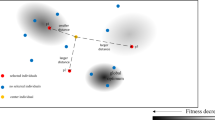Abstract
Differential evolution (DE) is known among the best methods for solving real-world optimization problems owing to its simple and efficient nature. Since almost all real-world applications are constrained optimization problems, constraint handling techniques are required for differential evolution algorithms. Conventional constraint handling techniques for DE mainly focus on discarding or devaluing the infeasible solutions, leading to an information loss of the infeasible region. To strike the balance between the explorations of the feasible region and the infeasible region, we look into the bi-objective space constituted by the objective function and the total constraint violation, and define the infeasible solution which has the lowest degree of constraint violation and lies in the Pareto front as the best infeasible solution. We discuss how the best infeasible solution help improve the current best solution. Based on this, we propose an improved differential evolution algorithm with adaptive ranking-based constraint handling technique (AR-DE). First, we start by identifying the best feasible solution and the best infeasible solution of the current population. Second, to guide the population evolving toward these solutions, different mutation and selection operators are proposed. Third, we design the adaptive control to automatically choose the operators to fit different stages of the evolution and various situations of the population. We conduct experimental studies by comparing with other widely used constraint handling techniques based on the cardinal version of differential evolution for fair competition. Standard test problems and five well-known engineering constrained optimization design problems are used to evaluate the effectiveness of AR-DE. Statistical outcomes show that the overall results of AR-DE are better than those of the other comparing methods. We also investigate the ability of AR-DE to obtain feasible solutions, and tune the parameters to achieve better performance.










Similar content being viewed by others
Data availability
Data are available on reasonable request.
Code availability
Code is available on reasonable request.
References
Afshari H, Hare W, Tesfamariam S (2019) Constrained multi-objective optimization algorithms: Review and comparison with application in reinforced concrete structures. Appl Soft Comput J 83:105631. https://doi.org/10.1016/j.asoc.2019.105631
Balande U, Shrimankar D (2019) SRIFA: Stochastic ranking with improved-firefly-algorithm for constrained optimization engineering design problems. Mathematics. https://doi.org/10.3390/math7030250
Biedrzycki R, Arabas J, Jagodzinski D (2019) Bound constraints handling in Differential Evolution: an experimental study. Swarm Evol Comput. https://doi.org/10.1016/j.swevo.2018.10.004
Cai Z, Wang Y (2006) A multiobjective optimization-based evolutionary algorithm for constrained optimization. IEEE Trans Evol Comput 10:658–675. https://doi.org/10.1109/TEVC.2006.872344
Cao H, Chen Y, Zhou Y et al (2020) Comparative study of four penalty-free constraint-handling techniques in structural optimization using harmony search. Eng Comput. https://doi.org/10.1007/s00366-020-01162-0
Chen X, Wang D, Yin J, Jia C (2019) Augmented Lagrange geolocation algorithm using TDOA measurements and calibration sources in the presence of satellite position errors. AEU–Int J Electron Commun 111:152900. https://doi.org/10.1016/j.aeue.2019.152900
Civicioglu P, Besdok E (2021) Bezier search differential evolution algorithm for numerical function optimization: a comparative study with CRMLSP, MVO, WA, SHADE and LSHADE. Expert Syst Appl 165:113875. https://doi.org/10.1016/j.eswa.2020.113875
Civicioglu P, Besdok E (2022) Contrast stretching based pansharpening by using weighted differential evolution algorithm. Expert Syst Appl 208:118144. https://doi.org/10.1016/j.eswa.2022.118144
Civicioglu P, Besdok E (2022b) Bernstein-Levy differential evolution algorithm for numerical function optimization. Neural Comput Appl 35:6603–6621. https://doi.org/10.1007/s00521-022-08013-7
Cui L, Li G, Zhu Z et al (2018) A novel differential evolution algorithm with a self-adaptation parameter control method by differential evolution. Soft Comput 22:6171–6190. https://doi.org/10.1007/s00500-017-2685-5
Das S, Mullick SS, Suganthan PN (2016) Recent advances in differential evolution-an updated survey. Swarm Evol Comput 27:1–30. https://doi.org/10.1016/j.swevo.2016.01.004
Datta R, Deb K, Kim JH (2019) CHIP: constraint handling with individual penalty approach using a hybrid evolutionary algorithm. Neural Comput Appl 31:5255–5271. https://doi.org/10.1007/s00521-018-3364-x
Davtalab-Olyaie M, Asgharian M, Nia VP (2019) Stochastic ranking and dominance in DEA. Int J Prod Econ 214:125–138. https://doi.org/10.1016/j.ijpe.2019.04.004
De Melo VV, Iacca G (2014) A modified covariance matrix adaptation evolution Strategy with adaptive penalty function and restart for constrained optimization. Expert Syst Appl 41:7077–7094. https://doi.org/10.1016/j.eswa.2014.06.032
de Rodrigues-Castro M, Guimarães S, de Lima BSLP (2018) E-BRM: a constraint handling technique to solve optimization problems with evolutionary algorithms. Appl Soft Comput J 72:14–29. https://doi.org/10.1016/j.asoc.2018.07.048
Deb K (2000) An efficient constraint handling method for genetic algorithms. Comput Methods Appl Mech Eng 186:311–338. https://doi.org/10.1016/S0045-7825(99)00389-8
Deng W, Shang S, Cai X et al (2021) An improved differential evolution algorithm and its application in optimization problem. Soft Comput 25:5277–5298. https://doi.org/10.1007/s00500-020-05527-x
Gandomi AH, Deb K (2020) Implicit constraints handling for efficient search of feasible solutions. Comput Methods Appl Mech Eng 363:112917. https://doi.org/10.1016/j.cma.2020.112917
Günen MA, Civicioglu P, Beşdok E (2016) Differential search algorithm based edge detection. Int Arch Photogramm Remote Sens Spat Inf Sci - ISPRS Arch 41:667–670. https://doi.org/10.5194/isprsarchives-XLI-B7-667-2016
Günen MA, Atasever UH, Beşdok E (2020) Analyzing the contribution of training algorithms on deep neural networks for hyperspectral image classification. Photogramm Eng Remote Sensing 86:581–588. https://doi.org/10.14358/PERS.86.9.581
Hellwig M, Beyer HG (2019) Benchmarking evolutionary algorithms for single objective real-valued constrained optimization – a critical review. Swarm Evol Comput 44:927–944. https://doi.org/10.1016/j.swevo.2018.10.002
Jan MA, Sagheer M, Khan HU et al (2020) Hybrid stochastic ranking for constrained optimization. IEEE Access 4:1–18. https://doi.org/10.1109/ACCESS.2020.3044439
Jan MA, Mahmood Y, Khan HU et al (2021) Feasibility-guided constraint-handling techniques for engineering optimization problems. Comput Mater Contin 67:2845–2862. https://doi.org/10.32604/cmc.2021.015294
Javed H, Jan MA, Tairan N et al (2019) On the efficacy of ensemble of constraint handling techniques in self-adaptive differential evolution. Mathematics 7:1–19. https://doi.org/10.3390/math7070635
Jordehi AR (2015) A review on constraint handling strategies in particle swarm optimisation. Neural Comput Appl 26:1265–1275. https://doi.org/10.1007/s00521-014-1808-5
Joshi S, Jayadeva RG, Chandra S (2012) Using sequential unconstrained minimization techniques to simplify SVM solvers. Neurocomputing 77:253–260. https://doi.org/10.1016/j.neucom.2011.07.010
Lu Z, Deb K, Singh H (2018) Balancing survival of feasible and infeasible solutions in constraint evolutionary optimization algorithms. In: 2018 IEEE Congr Evol Comput CEC 2018 - Proc. https://doi.org/10.1109/CEC.2018.8477976
Mallipeddi R, Suganthan PN (2010) Ensemble of constraint handling techniques. IEEE Trans Evol Comput 14:561–579. https://doi.org/10.1109/TEVC.2009.2033582
Mezura-Montes E, Coello Coello CA (2011) Constraint-handling in nature-inspired numerical optimization: past, present and future. Swarm Evol Comput 1:173–194. https://doi.org/10.1016/j.swevo.2011.10.001
Miranda-Varela ME, Mezura-Montes E (2018) Constraint-handling techniques in surrogate-assisted evolutionary optimization. an empirical study. Appl Soft Comput J 73:215–229. https://doi.org/10.1016/j.asoc.2018.08.016
Mohammadi-Balani A, Dehghan Nayeri M, Azar A, Taghizadeh-Yazdi M (2021) Golden eagle optimizer: a nature-inspired metaheuristic algorithm. Comput Ind Eng 152:107050. https://doi.org/10.1016/j.cie.2020.107050
Runarsson TP, Yao X (2000) Stochastic ranking for constrained evolutionary optimization. IEEE Trans Evol Comput 4:284–294. https://doi.org/10.1109/4235.873238
Sallam KM, Elsayed SM, Sarker RA, Essam DL (2020) Landscape-assisted multi-operator differential evolution for solving constrained optimization problems. Expert Syst Appl 162:113033. https://doi.org/10.1016/j.eswa.2019.113033
Samanipour F, Jelovica J (2020) Adaptive repair method for constraint handling in multi-objective genetic algorithm based on relationship between constraints and variables. Appl Soft Comput J. https://doi.org/10.1016/j.asoc.2020.106143
Stanovov V, Akhmedova S, Semenkin E (2020) Combined fitness–violation epsilon constraint handling for differential evolution. Soft Comput 24:7063–7079. https://doi.org/10.1007/s00500-020-04835-6
Storn R, Price K (1997) Differential evolution - a simple and efficient heuristic for global optimization over continuous spaces. J Glob Optim 11:341–359. https://doi.org/10.1023/A:1008202821328
Taheri SM, Hesamian G (2013) A generalization of the Wilcoxon signed-rank test and its applications. Stat Pap 54:457–470. https://doi.org/10.1007/s00362-012-0443-4
Tan Z, Li K, Wang Y (2021) Differential evolution with adaptive mutation strategy based on fitness landscape analysis. Inf Sci (NY) 549:142–163. https://doi.org/10.1016/j.ins.2020.11.023
Yang Y, Liu J, Tan S, Wang H (2019) A multi-objective differential evolutionary algorithm for constrained multi-objective optimization problems with low feasible ratio. Appl Soft Comput J 80:42–56. https://doi.org/10.1016/j.asoc.2019.02.041
Zahara E, Kao YT (2009) Hybrid Nelder-Mead simplex search and particle swarm optimization for constrained engineering design problems. Expert Syst Appl 36:3880–3886. https://doi.org/10.1016/j.eswa.2008.02.039
Zhang Y, Jin Z (2021) Comprehensive learning Jaya algorithm for engineering design optimization problems. J Intell Manuf. https://doi.org/10.1007/s10845-020-01723-6
Zhang J, Sanderson AC (2009) JADE: Adaptive differential evolution with optional external archive. IEEE Trans Evol Comput 13:945–958. https://doi.org/10.1109/TEVC.2009.2014613
Funding
This work is supported by National Natural Science Foundation of China (NSFC) under project Nos. 72174019 and 72021001.
Author information
Authors and Affiliations
Contributions
All authors contributed to the study conception, design and writing.
Corresponding author
Ethics declarations
Conflict of interest
The authors declare that they have no known competing financial interests or personal relationships that could have appeared to influence the work reported in this paper.
Ethical approval
This article does not contain any studies with human or animal subjects performed by any of the authors.
Consent to participate
All authors have checked the manuscript and have agreed to the submission.
Consent for publication
This manuscript is the authors' original work and has not been published nor has it been submitted simultaneously elsewhere.
Additional information
Publisher's Note
Springer Nature remains neutral with regard to jurisdictional claims in published maps and institutional affiliations.
Rights and permissions
Springer Nature or its licensor (e.g. a society or other partner) holds exclusive rights to this article under a publishing agreement with the author(s) or other rightsholder(s); author self-archiving of the accepted manuscript version of this article is solely governed by the terms of such publishing agreement and applicable law.
About this article
Cite this article
Li, Y., Zhao, Q. & Luo, K. Differential evolution improvement by adaptive ranking-based constraint handling technique. Soft Comput 27, 11485–11504 (2023). https://doi.org/10.1007/s00500-023-08335-1
Accepted:
Published:
Issue Date:
DOI: https://doi.org/10.1007/s00500-023-08335-1




